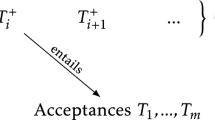Abstract
According to an influential characterisation of reflective equilibrium, it is a kind of algorithm for licensing explicitly normative claims in philosophical inquiries. Call this the machine-view of reflective equilibrium. The machine-view implies a causal relation between input and output data that is devoid of human agency in any significant sense. In this paper, I argue for a neo-Aristotelian alternative view. According to this view, the judgement that is called forth in the decision procedure of reflective equilibrium is a rational response of an epistemic agent, which integrates the whole of her character as a knower, both cognitive and affective, and which cannot be reduced to the explicit following of rules or an algorithm. Unlike the machine-view, this alternative account is able to support the dynamic structure and the normative status of the decision procedure.
Similar content being viewed by others
Notes
NE for Aristotle’s Nicomachean Ethics. All references to Aristotle's Nichomachean Ethics are from Crisp's (2004) translation and edition.
References
Aristotle. (2004). In R. Crisp (Ed.), Nicomachean Ethics. Cambridge: Cambridge University Press.
Bealer, George. (1998). “Intuition and the Autonomy of Philosophy.” In Rethinking Intuition: The Psychology of Intuition and its Role in Philosophical Inquiry, edited by Michael DePaul & William Ramsey (Rowman & Littlefield), pp. 201-240.
Dancy, J. (2004). Ethics Without Principles. Oxford: Oxford University Press.
Daniels, N. (1979). Wide Reflective Equilibrium and Theory Acceptance in Ethics. Journal of Philosophy, 76(5), 256–282.
Daniels, N. (1980). Reflective Equilibrium and Archimedean Points. Canadian Journal of Philosophy, 10(1), 83–103.
DePaul, Michael. (1998). “Why Bother with Reflective Equilibrium?” In Rethinking Intuition: The Psychology of Intuition and its Role in Philosophical Inquiry, edited by Michael DePaul & William Ramsey (Rowman & Littlefield), pp. 293-309.
Duhem, P. (1954). The Aim and Structure of Physical Theory. Princeton: Princeton University Press.
Goodman, N. (1956). Fact, Fiction and Forecast. Cambridge: Harvard University Press.
Louden, R. (1997). What is Moral Authority? Ancient Philosophy, 17(1), 103–118.
Nussbaum, M. (1990). Love’s Knowledge: Essays on Philosophy and Literature. Oxford: Oxford University Press.
Pritchard, D. (2012). On Meta-Epistemology. Harvard Review of Philosophy, XVIII, 91–108.
Rawls, J. (1951). Outline of a Decision Procedure for Ethics. Philosophical Review, 60(2), 177–197.
Rawls, J. (1971). A Theory of Justice. Cambridge: Harvard University Press.
Rawls, J. (1974). The Independence of Moral Theory. American Philosophical Association, 48, 5–22.
Scanlon, T. M. (2003). Rawls on Justification. In S. Freeman (Ed.), Cambridge Companion to Rawls. Cambridge: Cambridge University Press.
Smith, M. (2007). In Defence of Ethics and the A Priori: Selected Essays on Moral Psychology and Meta-Ethics: Reply to Enoch, Heironymi, and Tannenbaum. Philosophical Books, 48, 136–149.
Stich, S., & Nisbett, R. (1980). Justification and the Psychology of Human Reasoning. Philosophy of Science, 47(2), 188–202.
Stich, S. (1988). Reflective Equilibrium, Analytic Epistemology and the Problem of Cognitive Diversity. Synthese, 74(3), 391–413.
Stich, S. (1990). The Fragmentation of Reason: Preface to a Pragmatic Theory of Cognitive Evaluation. Cambridge: MIT Press.
Stich, Stephen. (1998). Reflective Equilibrium, Analytic Epistemology and the Problem of Cognitive Diversity. In Rethinking Intuition: The Psychology of Intuition and its Role in Philosophical Inquiry, edited by Michael DePaul & William Ramsey (Rowman & Littlefield), pp. 96-112.
Weinberg, J., Nichols, S., & Stich, S. (2001). Epistemic Intuition and Normativity. In J. Knobe & S. Nichols (Eds.), Experimental Philosophy. Oxford: Oxford University Press.
Author information
Authors and Affiliations
Corresponding author
Additional information
Publisher’s Note
Springer Nature remains neutral with regard to jurisdictional claims in published maps and institutional affiliations.
I wish to thank the anonymous reviewers of Philosophia and Prof. dr. Sylvia Wenmackers for helpful comments in improving this paper.
Rights and permissions
About this article
Cite this article
Irikefe, P.O. An Agent-Based Account of the Normativity of Reflective Equilibrium. Philosophia 48, 217–225 (2020). https://doi.org/10.1007/s11406-019-00080-w
Received:
Revised:
Accepted:
Published:
Issue Date:
DOI: https://doi.org/10.1007/s11406-019-00080-w



